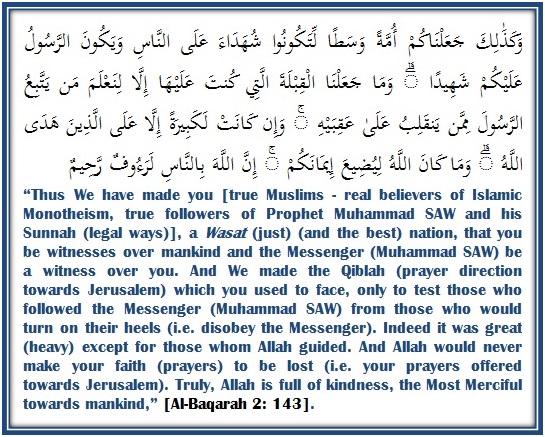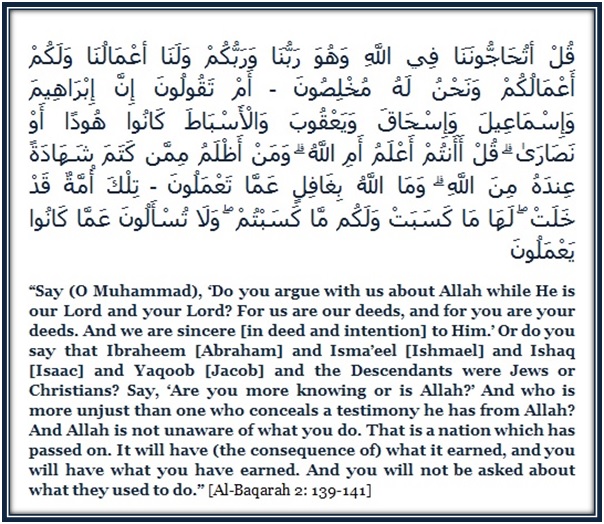Tafseer Surah Baqarah Verse 144-147 | Surah Baqarah explanation in English | Surah Baqarah explained | Surah Baqarah Ayat 144 to 147
Tafseer Surah Baqarah Verse 144-147 | Surah Baqarah explanation in English | Surah Baqarah explained | Surah Baqarah Ayat 144 to 147 Translation
 |
| Surah Baqarah Verse 144 |
Lessons:
How do we behave in the Masjid or in a religious gathering? How disciplined are we? How much respect do we give to our leaders? Most importantly how submissive are we to the commands of Allah subhanahu wa ta’ala? What do we do with the Sunnah? When someone is informed of a Sunnah he asks the logic or a benefit behind following it. If we are looking for logic and benefit then this is not called following the Messenger salAllahu ‘alayhi wa sallam. Following the commands of Allah subhanahu wa ta’ala and the Sunnah should come from our heart, and not because of benefits or fear of other people.
Allah subhanahu wa ta’ala says, “…wheresoever you people are, turn your faces (in prayer) in that direction (Al-Masjid al-Haram).” It is a command from Allah to face the Ka’abah from wherever one is on the earth: the east, west, north or south. The exception is of the voluntary prayer [Nafl] while one is traveling, for one is allowed to offer it in any direction his body is facing, while his heart is intending the Ka’abah. Also, when the battle is raging, one is allowed to offer prayer, however, he is able. Ibn Katheer writes: also, included are those who are not sure of the direction and offer prayer in the wrong direction, thinking that it is the direction of the Qiblah, because Allah subhanahu wa ta’ala does not burden a soul beyond what it can bear.
There is no excuse for leaving the prayer; wherever we might be in the world we are to offer the prayers at their appointed time in the direction of the Ka’abah. Now, alhumdulillah, as there are Apps available there is no difficulty in finding the direction of Ka’abah or the prayer time. Download one on your device and don’t miss your prayers.
“Certainly, the people who were given the Scripture know well that, that is the truth from their Lord,” meaning the Jews, who did not like that you change your Qiblah from Bayt Al-Maqdis, already knew that Allah subhanahu wa ta’ala will send this command to face the Ka`bah. They read in their Books their Prophets’ description of Allah’s Messenger salAllahu ‘alayhi wa sallam and his Ummah, and that Allah subhanahu wa ta’ala has endowed and honored him with the complete and honorable legislation. Yet, the People of the Book deny these facts because of their envy, disbelief and rebellion. This is why Allah subhanahu wa ta’ala threatened them when He said:
وَمَا اللَّهُ بِغَـفِلٍ عَمَّا يَعْمَلُونَ
“And Allah is not unaware of what they do.”
Despite knowing the truth, they started arguments and criticism as a mean to spread confusion and make Muslims disobey their messenger. They had previously done this in many instances. Allah subhanahu wa ta’ala tells us that they ‘know’ this change of the direction is the truth, and warns them to not go against what they already know.
Lesson:
When you begin following the commands of Allah subhanahu wa ta’ala and the Sunnah of the Messenger salAllahu ‘alayhi wa sallam, you can face intense criticism. The non-practicing ones will make fun of you that how you dress up, call you names, shame and disrespect you and try all the ways by which they can make you revert to your past life. Through this ayah, Allah subhanahu wa ta’ala reminds us that we should not have the fear of people in our hearts. We should be strong Muslims who only fear Allah subhanahu wa ta’ala and no one else. We should also not fall for Fitnah or propaganda. Learn your Deen and be firm on the Straight Path.
Ayah 145 – the Stubbornness and Disbelief of the Jews
Allah subhanahu wa ta’ala describes the Jews’ disbelief, stubbornness and defiance of what they know of the truth of Allah’s Messenger salAllahu ‘alayhi wa sallam. Even if the Prophet salAllahu ‘alayhi wa sallam brought forward every proof to the truth of what he was sent with, the Jews will never obey him or abandon following their desires, as was said in Surah At-Tawbah ayaat 96-97.
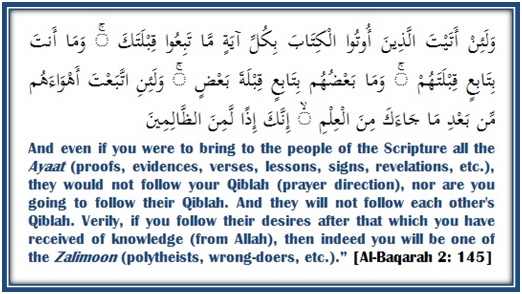 |
| Surah Baqarah Verse 145 |
Allah subhanahu wa ta’ala tells us that we should neither fear other people, nor exert ourselves in convincing the People of the Book that Ka’abah is their Qiblah as well. They do not agree on the direction of prayer among themselves, so why do you listen to their criticisms about your religion? One group among the People of the Book faces one side of Bayt Al-Maqdis, the other group faces another side. Don’t follow their desires especially when Allah subhanahu wa ta’ala has guided you.
“…nor are you going to follow their Qiblah,” indicates the vigor with which Allah’s Messenger salAllahu ‘alayhi wa sallam implements what Allah subhanahu wa ta’ala commanded him. It also indicates that as much as the Jews adhere to their opinions and desires, the Prophet salAllahu ‘alayhi wa sallam adheres by Allah’s commands, obeying Him and following what pleases Him, and that he would never adhere to their desires in any case. Hence, praying towards Bayt Al-Maqdis was not because it was the Qiblah of the Jews, but because Allah subhanahu wa ta’ala had commanded it. Allah subhanahu wa ta’ala then warns those who knowingly defy the truth, because the proof against those who know is stronger than against other people. This is why Allah subhanahu wa ta’ala said to His Messenger and his Ummah, “Verily, if you follow their desires after that which you have received of knowledge, then indeed you will be one of the wrongdoers.”
Lesson:
Allah subhanahu wa ta’ala has given us the Qur’an, this is our guideline. If after being guided, we follow the path of the misguided ones then we will be accountable in the Hereafter.
Ayaat 146 – 147 – the Jews knew the Truth about Messenger salAllahu ‘alayhi wa sallam yet chose to hide it
Allah subhanahu wa ta’ala states that the scholars of the People of the Scripture know the truth of what Allah’s Messenger salAllahu ‘alayhi wa sallam was sent with, just as one of them knows his own child, which is a parable that the Arabs use to describe what is apparent.
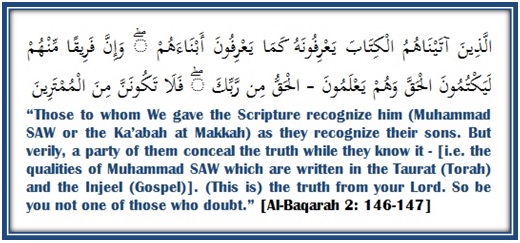 |
| Surah Baqarah Verse 146-147 |
If you are a parent, you know how to find your child even if he gets lost in a crowd. If you have identical twins, while other people might have a problem in identifying the two children, you being a parent (esp. mother) would know who is who.
Allah subhanahu wa ta’ala states next that although they had knowledge and certainty in the Prophet salAllahu ‘alayhi wa sallam, they still conceal the truth. It means that he who is true in his faith will accept the truth. He will not look at what other people say or do, but rather accept the truth when it reaches him.
Allah subhanahu wa ta’ala then strengthens the resolve of His Prophet salAllahu ‘alayhi wa sallam and the believers and affirms that what the Prophet salAllahu ‘alayhi wa sallam came with is the truth without doubt.
الْحَقُّ مِن رَّبِّكَ فَلاَ تَكُونَنَّ مِنَ الْمُمْتَرِينَ
“(This is) the truth from your Lord. So be you not one of those who doubt,” a similar statement was said in Surah Al-Anaam ayah 114.
May He make us strong Muslims, and not allow us to be deceived by what people do or say, ameen.
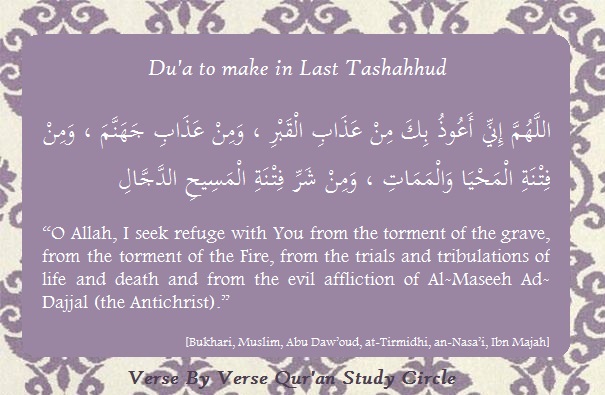 |
| Dua to make in last Tashahhud |
